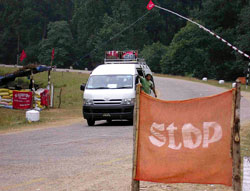|
|
| HELD-UP: This PLA checkpost-cum-tollbooth near the Banke border, 55 km east of Nepalganj, is in clear violation of the ceasefire agreement. |
Five months since the National Monitoring Committee on the Code of Conduct for the Ceasefire was formed, it's still unclear what its 25 members are up to.
The Maoists in particular continue to violate the ceasefire, as the daily reports of human rights abuses, abductions, and extortion show. They are defying the rule of law, and taking the law into their own hands, dispensing justice through kangaroo courts and street action. The Maoist militia publicly displays weapons, and rights groups warn that the Maoists continue to recruit new members, including children, into the 'People's Liberation Army'.
Meanwhile, even members agree that the 25-strong committee is looking rather like a lame duck. "It's a powerless committee, and was formed only to serve the interests of both the SPA and the Maoists," says committee member and rights activist Subodh Pyakurel.
There is a growing divide in the committee between a handful of rights workers and journalists, and the majority of political representatives handpicked from the SPA and the Maoists. The rights workers argue that many of the political appointees, though professionals, have little relevant experience, barely any knowledge of human rights issues, poor negotiation skills, and no idea of how to carry out such monitoring.
On a recent visit to Dhanusa to begin preliminary investigation of a reported violation, members spoke to a roadside teashop owner a few hours' walk away from the site of the alleged violation, because the village was "too far" for them to walk to.
Even if all the members did have the ability to investigate, member Sushil Pyakurel says, "most of them have neither the power nor the courage to challenge the violating parties." His colleague on the committee and former NHRC member Kapil Shrestha goes so far as to call them "geriatric and fossilised." Shrestha believes the committee has "totally failed" in making the parties accountable to the code of conduct.
The committee has received 1,300 reports of violations so far, but not carried out one complete investigation. Some monitors say they have no clear terms of reference, no presence in rural areas, and barely any resources.
As a result, members and observers fear the committee's actions might prove more dangerous than their inaction. The committee's mandate does not include 'rescue' of any sort, but earlier this week some committee members followed up a report of kidnapping by Maoists by showing up at the Brighter Toothpaste Factory in Thimi, where the abductees were being held. They had a chat with the rebels and got four released. One member told us the local cadres were polite. But the committee has issued no statement and did not raise the issue with Valley Maoist commanders.
While the committee oversteps its mandate on some occasions, it does not even have a checklist of violations and has not addressed crucial issues such as disappeared people and child rights abuses.
A political member told us a common subject of discussion at meetings is the very toothlessness of the committee. "This is a joke. It was formed just to present an acceptable face to the world, showing that both sides were serious about the ceasefire," he said. Members we spoke to said they were "embarrassed" to be part of the committee and would not speak on record.
Human rights activists on the committee say that it still has a chance to be effective-as long as the political appointees are dismissed. "There's no point sustaining the committee as it currently is-members are acting as advocates for their own parties, and not working objectively for the people and for justice," Shrestha said.



